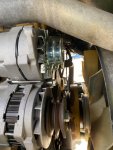The problem is you don't have a 12v side and a 24v side, you have 12v out of the middle of 24… in this case it is a basic arithmetic problem
Voltage on batteries in series is additive. IE 13.65 + 13.65 = 27.3. 27.3V coincidentally is the standard 24v regulator voltage setting and 13.65V per battery is a good low-mid range charge voltage(wont cook off so much electrolyte being applied long term like over the road trucks run).
the standard 12V automotive regulator setting is 14.5V. This is designed to help maintain a good state of charge with typical short duration automotive use, but it is a little high for long term charging…
The dumb regulators know only one thing, make regulated voltage. So if you apply 14.5v to the 12v battery in a series string with the first alternator, the 24v alt still only knows to make ITS rated voltage of 27.3, and it only applies enough voltage to make up the difference between the 14.5 and the its 27.3. This leaves the 12-24v series battery being starved with only 12.8V which is below the minimum accepted float voltage of 13.1…
this can be done, but it requires a custom regulator on the 12v alt set to 1/2 of the 24v alts output like 13.65 to go with a 27.3v alt. This is what the dual volts we have now do, switching/regulating the 12v output to 1/2 of the 24v Nominal regulated output. I could probably trick a 24v alt with remote sense into delivering double the 12v output with a couple of diodes, but something has to be done to make this work/balance the voltage seen by each battery.
Isnt math fun



